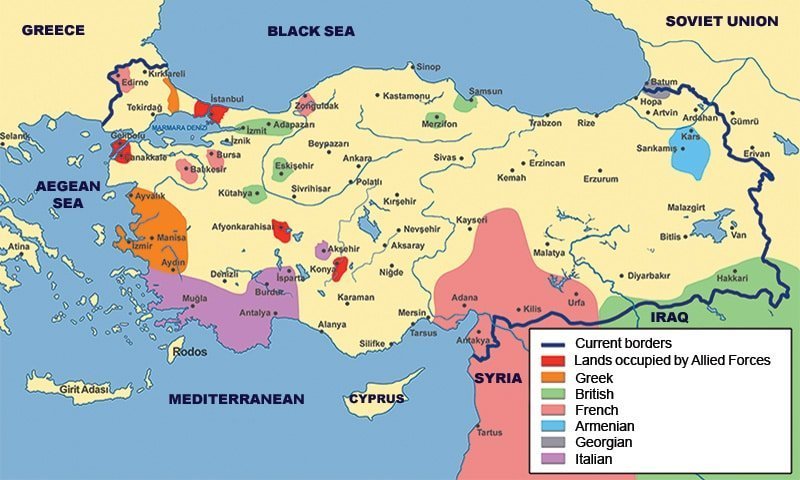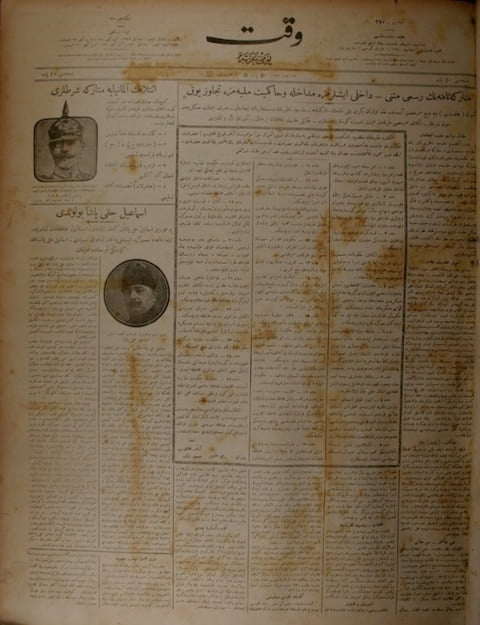On October 30, 1918, aboard the British battleship Agamemnon, anchored in the port of Mudros on the Aegean island of Lemnos, representatives of Great Britain and the Ottoman Empire sign an armistice treaty marking the end of Ottoman participation in the First World War.
The Armistice of Mudros, which was concluded on October 30, 1918, ended the hostilities in the Middle Eastern theatre of war between the Ottoman Empire and the Allies. It was signed by Rauf Bey, the Ottoman Minister of Marine, and the British Admiral Somerset Arthur Gough-Calthorpe, on board Agamemnon in Mudros harbor on the Aegean island of Lemnos. The armistice was followed with occupation of Istanbul, the subsequent partitioning of the Ottoman Empire, and the Treaty of Sèvres, although the latter was never ratified due to the Turkish victory at the War of Liberation.
Negotiations between Calthorpe’s team and the delegation from Constantinople, led by the Ottoman Minister of Marine Affairs Rauf Bey, began at 9:30 on the morning of October 30, 1918, aboard the Agamemnon. The Treaty of Mudros, signed that evening, stated that hostilities would end at noon the following day. By its terms, Turkey had to open the Dardanelle and Bosporus straits to Allied warships and its forts to military occupation; it was also to demobilize its army, release all prisoners of war and evacuate its Arab provinces, the majority of which were already under Allied control. Bey and his fellow delegates refused to paint the treaty as an act of surrender for Turkey—later causing disillusionment and anger in Constantinople—but in fact that is what it was. The Treaty of Mudros ended Ottoman participation in World War I and effectively—if not legally—marked the dissolution of a once mighty empire. From its ruins, the victors of the First World War attempted to use the post-war peace negotiations to create a new, more unpredictable entity: the modern Middle East.
Armistice Convention with Turkey
1. Opening of Dardanelles and Bosporus and secure access to the Black Sea. Allied occupation of Dardanelles and Bosporus forts.
2. Positions of all minefields, torpedo tubes and other obstructions in Turkish waters to be indicated, and assistance given to sweep or remove them as may be required.
3. All available information as to mines in the Black Sea to be communicated.
4. All Allied prisoners of war and Armenian interned persons and prisoners to be collected in Constantinople and handed over unconditionally to the Allies.
|
5. Immediate demobilisation of the Turkish Army except for such troops as are required for surveillance of frontiers and for the maintenance of internal order (number of effectives and their disposition to be determined later by the Allies after consultation with the Turkish Government).
6. Surrender of all war vessels in Turkish waters or in waters occupied by Turkey; these ships to be interned at such Turkish port or ports as may be directed, except such small vessels as are required for police or similar purposes in Turkish territorial waters.
7. The Allies to have the right to occupy any strategic points in the event of a situation arising which threatens the security of the Allies.
8. Free use by the Allied ships of all ports and anchorages now in Turkish occupation, and denial of their use to the enemy. Similar conditions to apply to Turkish mercantile shipping in Turkish waters for purposes of trade and the demobilisation of the army.
9. Use of all ship repair facilities at all Turkish ports and arsenals.
10. Allied occupation of the Taurus tunnel system.
11. Immediate withdrawal of Turkish troops from northwest Persia to behind the pre-war frontier has already been ordered and will be carried out.
Part of Trans-Caucasia has already been ordered to be evacuated by Turkish troops, the remainder to be evacuated if required by the Allies after they have studied the situation there.
12. Wireless telegraph and cable stations to be controlled by the Allies, Turkish Government messages excepted.
13. Prohibition to destroy any naval, military, or commercial material.
14. Facilities to be given for the purchase of coal and oil-fuel and naval material from Turkish sources after the requirements of the country have been met.
None of the above material to be exported.
15. Allied Control Officers to be placed on all railways, including such portions of Trans-Caucasian railways now under Turkish control, which must be placed at the free and complete disposal of the Allied authorities, due consideration being given to the needs of the population.
This clause to include Allied occupation of Batoum. Turkey will raise no objection to the occupation of Baku by the Allies.
16. Surrender of all garrisons in Hejaz, Assir, Yemen, Syria, and Mesopotamia to the nearest Allied commander; and the withdrawal of troops from Cilicia, except those necessary to maintain order, as will be determined under Clause 5.
17. Surrender of all Turkish officers in Tripolitania and Cyrenaica to the nearest Italian garrison. Turkey guarantees to stop supplies and communications with these officers if they do not obey the order to surrender.
18. Surrender of all ports occupied in Tripolitania and Cyrenaica, including Misurata, to the nearest Allied garrison.
19. All Germans and Austrians, naval, military, and civilian, to be evacuated within one month from Turkish dominions: those in remote districts as soon after as may be possible.
20. Compliance with such orders as may be conveyed for the disposal of the equipment, arms and ammunition, including transport, of that portion of the Turkish Army which is demobilised under Clause 5.
21. An allied representative to be attached to the Turkish Ministry of Supplies in order to safeguard Allied interests. This representative to be furnished with all information necessary for this purpose.
22. Turkish prisoners to be kept at the disposal of the Allied Powers. The release of Turkish civilian prisoners and prisoners over military age to be considered.
23. Obligation on the part of Turkey to cease all relations with the Central Powers.
24. In case of disorder in the six Armenian vilayets, the Allies reserve to themselves the right to occupy any part of them.
25. Hostilities between the Allies and Turkey shall cease from noon, local time, on Thursday, October 31, 1918.
Signed in duplicate on board His Britannic Majesty’s Ship Agamemnon, at Port Mudros,
Lemnos, the 30th October, 1918.
(Signed) Arthur Calthorpe
Hussein Raouf
Rechad Hikmet
Saadullah
Sources:
- Turkeyswar.com / © Altay Atlı
- Histor.com
TIP: You can find many interesting articles about Turkey’s history and culture on our Dalyan Guide section



Comments